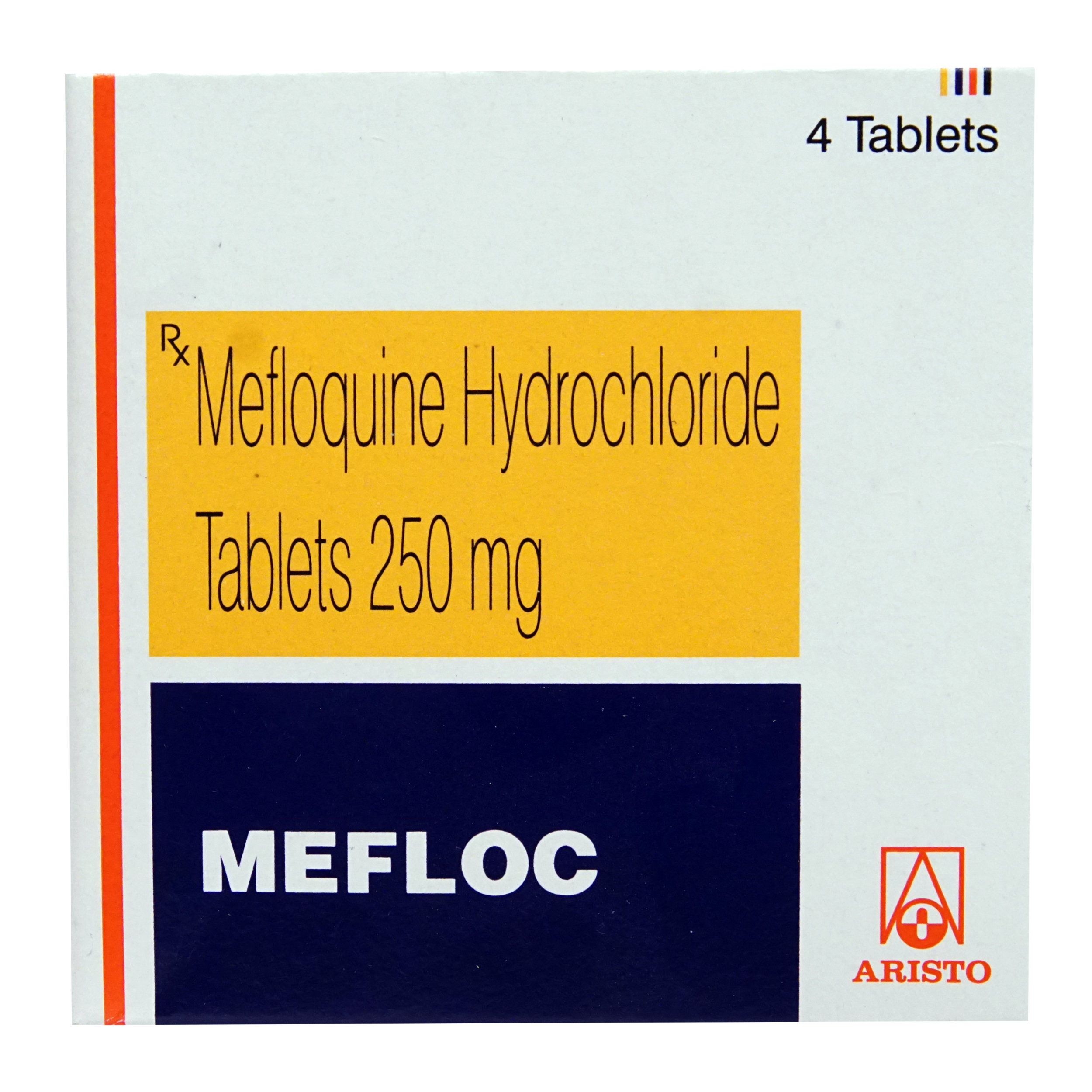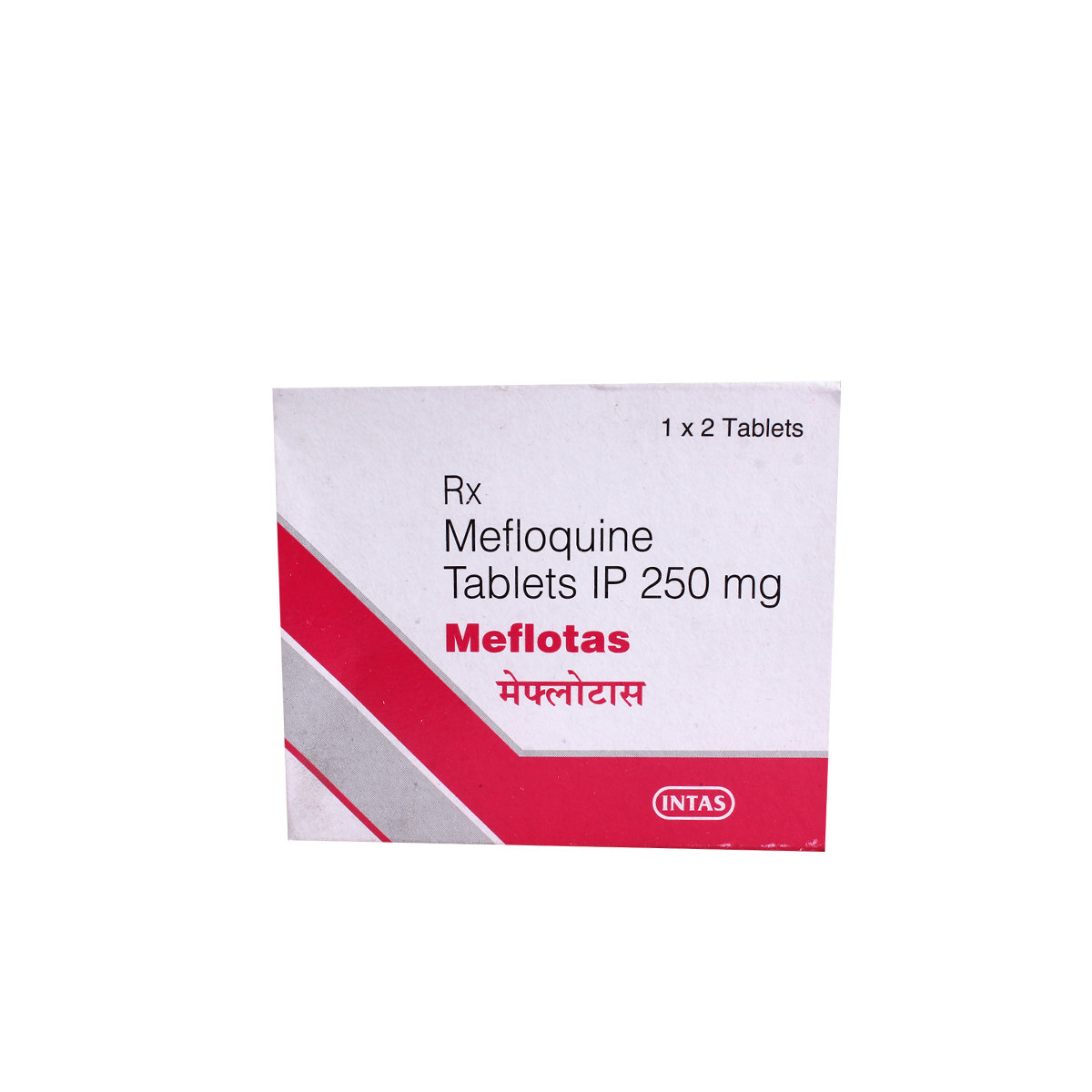Mefloquine
About Mefloquine
Mefloquine comes into the category of 'Antimalarials' mainly used to treat or prevent malaria. Malaria is a life-threatening disease that is spread by the bite of an infected mosquito (anopheles mosquito). When an infected mosquito bites a healthy person, then it transmits the infections into the bloodstream, which after several days starts affecting the red blood cells & liver cells, breaking them in the process. Usually, an infected person starts noticing the symptoms of malaria within 10 days to 4 weeks after the infection that include shaking chills, high fever, profuse sweating, headache, nausea, vomiting, abdominal pain, diarrhea, anemia, muscle pain, convulsions, coma and bloody stools.
Mefloquine contains ‘mefloquine’, which acts by killing the malarial parasites. It works by enhancing the levels of heme in the blood. Haeme is a substance toxic to the malarial parasite. In this way, the parasite gets killed by its toxic by-products released during its metabolism of hemoglobin. This kills the parasite and prevents the infection from spreading.
Take Mefloquine as prescribed by your doctor. You are advised to take Mefloquine for as long as your doctor has prescribed it for you based on your medical condition. You may experience sleeping problems (bad dreams, sleepiness, unable to sleep), headache, dizziness, vertigo (loss of balance), itching, nausea, vomiting, stomach pain or diarrhoea. Most of these side effects of Mefloquine do not require medical attention and gradually resolve over time. However, if the side effects persist or worsen, please consult your doctor.
Before taking Mefloquine, please inform your doctor if you have any allergy to Mefloquine or its active part. Mefloquine should not be taken in conditions like liver disease, kidney disease, eye problems and epilepsy/ fits disorder. Mefloquine should not be given to children less than 3 months. If you are pregnant or breastfeeding, please inform your doctor before taking Mefloquine. Do not drive or use a machine while taking Mefloquine as it causes dizziness. If you have some tolerance for sugar, you should not take Mefloquine. Contact your doctor before taking Mefloquine.
Uses of Mefloquine
Medicinal Benefits
Mefloquine falls into a group of medicines known as antimalarials, which are indicated for treating or preventing malaria. Mefloquine contains mefloquine, which is quinoline medicine, that works by enhancing the levels of heme in the blood. Haeme is a substance toxic to the malarial parasite. In this way, the parasite gets killed by its toxic by-products released during its metabolism of hemoglobin. This kills the parasite and prevents the infection from spreading.
Directions for Use
Storage
Side Effects of Mefloquine
- Sleeping problems (bad dreams, sleepiness, unable to sleep)
- Headache
- Dizziness
- Vertigo (loss of balance)
- Itching
- Nausea
- Vomiting
- Stomach pain
- Diarrhoea
Drug Warnings
Mefloquine should not be taken in conditions like epilepsy/fits, heart problems, liver/ kidney disease, eye problems, inflammation in the lungs, and low blood sugar level. Before taking Mefloquine inform your doctor if you have suicidal thoughts, severe anxiety, abnormal dreams, insomnia (difficulty in sleeping), depression, feeling restless and confusion. Before taking Mefloquine, please inform your doctor if you have any allergy to Mefloquine or its active part Mefloquine should not be given to children less than 3 months. If you are pregnant or breastfeeding, please inform your doctor before taking Mefloquine. Do not drive or use a machine while taking Mefloquine as it causes dizziness. If you have some tolerance for sugar, you should not take Mefloquine. Contact your doctor before taking Mefloquine.
Drug Interactions
Drug-Drug Interaction: Mefloquine may interact with other antimalarial medicines (chloroquine, quinidine, quinine), antidepressants (amitriptyline), antipsychotics (phenothiazine), medicines for fits/epilepsy (carbamazepine, phenytoin, phenobarbital, valproate), antifungal (ketoconazole), antibiotics (rifampicin, penicillins, cephalosporins), medicines for HIV infections (efavirenz), painkiller (tramadol), blood thinner (warfarin).
Drug-Food Interaction: No interactions found.
Drug-Disease Interaction: If you have depression, heart disease, fits/ epilepsy and liver disease, inform your doctor before taking Mefloquine.
Drug-Drug Interactions Checker List:
Safety Advice

Alcohol
unsafeA person should limit the consumption of alcohol as it may worsen the side effects. It may lead to liver damage.

Pregnancy
cautionMefloquine is given to pregnant women only if the doctor thinks benefits outweigh risks. Please consult a doctor if you are pregnant or planning for pregnancy.

Breast Feeding
cautionIt is not safe to breastfeed while taking Mefloquine. A patient is advised to take this drug only at a doctor's consultation.

Driving
cautionMefloquine may cause dizziness, so one should avoid driving or doing any activity that needs mental alertness.

Liver
cautionMefloquine should be used with caution in patients with impaired liver function. Consult your doctor before using Mefloquine.

Kidney
cautionMefloquine should be used with caution in patients with impaired kidney function. Consult your doctor before using Mefloquine.

Children
cautionMefloquine should not be used for children below 3 months. Mefloquine should be used only when prescribed by a child specialist.
Habit Forming
Diet & Lifestyle Advise
- A person should take nutritious food as when a person has a malarial fever, their body's requirement gets increased, and also taking high carbohydrate diet, Fresh fruits and vegetables help in recovering the body fast.
- During fever, a person may experience appetite loss, thus eating food becomes a challenge. To deal with this, one should drink glucose water, fresh fruit juices, coconut water, to supplying the body's requirements through liquids.
- High malaria fever makes the body weak and reduces appetite to take food that helps to synthesize immune bodies and help the body deal with parasites.
- A person should not take very high-fiber foods like green leafy vegetables, and fruits with thick skin, as the body is already in the healing stage and it also has to digest these complex foods.
- Take proper rest, which helps the body to relax and heal faster.
Special Advise
- Take Mefloquine as prescribed by your doctor, do not stop takin if you feel better.
- Your doctor may advice regular eye check up, during the treatment with Mefloquine as it may cause damage to the retina.
Patients Concern
Disease/Condition Glossary
Malaria: It is a life-threatening disease caused by parasites that enter the body through the bite of a mosquito. This is a common disease in countries like Africa, South America and Southeast Asia. This disease usually occurs when an infected mosquito (infected with the parasite 'Plasmodium', parasites are organisms that live in other living organisms for their survival) bites a healthy individual then this parasite gets transferred into the bloodstream and starts growing and destroying the red blood cells of the body. There are four parasites responsible for causing malaria that include Plasmodium vivax, P. ovale, P. malaria and P. falciparum. Generally, an infected person starts noticing the symptoms within 10 days to 4 weeks after the mosquito bite, which include shaking chills that can range from moderate to high fever, profuse sweating, headache, nausea, vomiting, abdominal pain, diarrhea, anemia, muscle pain, convulsions, coma and bloody stools.
FAQs
Mefloquine is safe if used in the dose and duration recommended by your doctor. Take it just as instructed and do not skip any dose. Follow your doctor's directions carefully and inform your doctor if any of the side effects disturb you.
No, do not stop taking Mefloquine without asking your doctor even if you are feeling better. Your symptoms may enhance before the infection is completely cured. Thus, for better and complete treatment, it is instructed to continue your treatment for the recommended duration.
It has been reported that taking Mefloquine for a long time may cause irreversible damage to the retina of your eye which can even lead to vision loss, so take this medicine for the time suggested by the doctor.
High fever with chills is the main symptom of malaria. The symptoms include feeling of cold and shivering, high fever, sweating. It also includes headache, nausea, body pain and weakness.
No, do not take antifungal (ketoconazole) with Mefloquine and for at least 15 weeks after you stop taking it. Serious, life-threatening side effects on your heart can occur. Consult your doctor for further advice.





